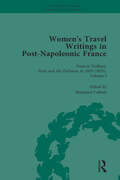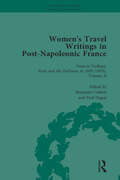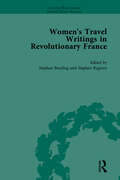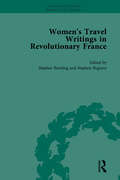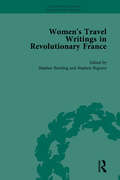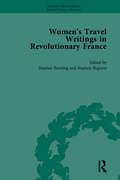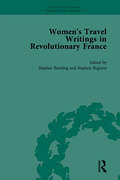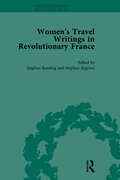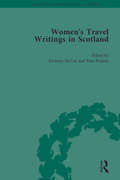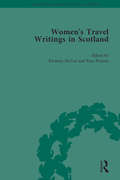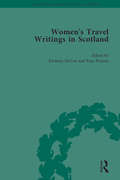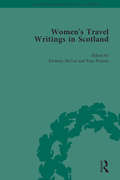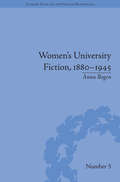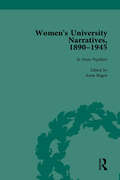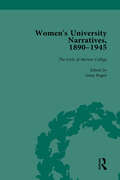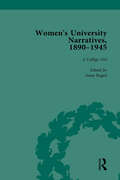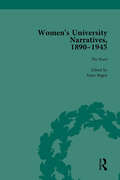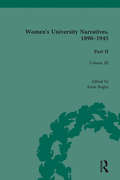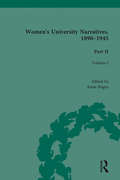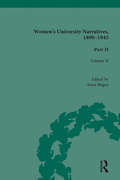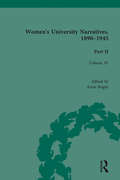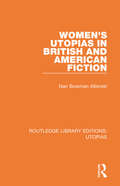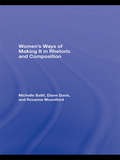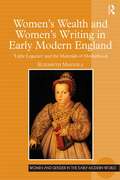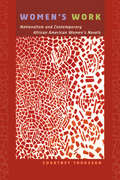- Table View
- List View
Women's Travel Writings in Post-Napoleonic France, Part II vol 7
by Stephen Bending Paul Hague Benjamin Colbert Stephen Bygrave Lucy MorrisonThis eight-volume set in two parts gives voice to some intrepid women travellers touring post-Napoleonic France. The volumes are facsimile editions and are introduced and edited by experts in their field.
Women's Travel Writings in Post-Napoleonic France, Part II vol 8
by Stephen Bending Paul Hague Benjamin Colbert Stephen Bygrave Lucy MorrisonThis eight-volume set in two parts gives voice to some intrepid women travellers touring post-Napoleonic France. The volumes are facsimile editions and are introduced and edited by experts in their field.
Women's Travel Writings in Revolutionary France, Part I Vol 2
by Stephen Bending Stephen BygraveA seven-volume facsimile set which comprises accounts of France in the 1790s. The texts are drawn from the Chawton House Library collection.
Women's Travel Writings in Revolutionary France, Part I Vol 3
by Stephen Bending Stephen BygraveA seven-volume facsimile set which comprises accounts of France in the 1790s. The texts are drawn from the Chawton House Library collection.
Women's Travel Writings in Revolutionary France, Part II vol 4
by Stephen Bending Stephen BygravePart of a seven-volume facsimile set, this volume comprises firsthand accounts of France in the 1790s. It includes Helen Maria Williams' letters which narrate the fall of Robespierre in 1794 and her 1798 book on Switzerland which comments sceptically on the necessary coexistence of liberty with peace.
Women's Travel Writings in Revolutionary France, Part II vol 5
by Stephen Bending Stephen BygravePart of a seven-volume facsimile set, this volume comprises firsthand accounts of France in the 1790s. It includes Helen Maria Williams' letters which narrate the fall of Robespierre in 1794 and her 1798 book on Switzerland which comments sceptically on the necessary coexistence of liberty with peace.
Women's Travel Writings in Revolutionary France, Part II vol 6
by Stephen Bending Stephen BygravePart of a seven-volume facsimile set, this volume comprises firsthand accounts of France in the 1790s. It includes Helen Maria Williams' letters which narrate the fall of Robespierre in 1794 and her 1798 book on Switzerland which comments sceptically on the necessary coexistence of liberty with peace.
Women's Travel Writings in Revolutionary France, Part II vol 7
by Stephen Bending Stephen BygravePart of a seven-volume facsimile set, this volume comprises firsthand accounts of France in the 1790s. It includes Helen Maria Williams' letters which narrate the fall of Robespierre in 1794 and her 1798 book on Switzerland which comments sceptically on the necessary coexistence of liberty with peace.
Women's Travel Writings in Scotland: Volume I (Chawton House Library: Women’s Travel Writings)
by Kirsteen McCue Pamela PerkinsThis volume contains the first volume of Anne Grant's Letters from the Mountains (1806), one of the Romantic era's most successful non-fictional accounts of the Scottish Highlands.
Women's Travel Writings in Scotland: Volume II (Chawton House Library: Women’s Travel Writings)
by Kirsteen McCue Pamela PerkinsThis volume contains the second volume of Anne Grant's Letters from the Mountains (1806), one of the Romantic era’s most successful non-fictional accounts of the Scottish Highlands. It is part of a four volume set, edited by Kirsteen McCue and Pam Perkins, which is accompanied by new editorial material including a new general introduction and headnotes to each work.
Women's Travel Writings in Scotland: Volume III (Chawton House Library: Women’s Travel Writings)
by Kirsteen McCue Pamela PerkinsThis volume contains the third volume of Anne Grant's Letters from the Mountains (1806), one of the Romantic era’s most successful non-fictional accounts of the Scottish Highlands.
Women's Travel Writings in Scotland: Volume IV (Chawton House Library: Women’s Travel Writings)
by Kirsteen McCue Pamela PerkinsThis volume contains Elizabeth Isabella Spence’s Letters from the North Highlands, one of the Romantic era’s most successful non-fictional accounts of the Scottish Highlands (1816), a work that, while influenced by Grant’s Letters from the Mountains (1806), attempted to move the genre of the Scottish travelogue in new directions.
Women's University Fiction, 1880–1945 (Literary Texts and the Popular Marketplace #5)
by Anna BogenThe rise of the middle classes brought a sharp increase in the number of young men and women able to attend university. Developing in the wake of this increase, the university novel often centred on male undergraduates at either Oxford or Cambridge. Bogen argues that an analysis of the lesser known female narratives can provide new insights.
Women's University Narratives, 1890-1945, Part I Vol 1: Key Texts (Routledge Historical Resources Ser.)
by Anna BogenFrom the late nineteenth century women began to enter British universities. Their numbers were small and their gains hard won and fiercely contested, yet they inspired a whole new genre of fiction. This collection of largely forgotten and rare texts forms a valuable primary resource for scholars of literature, social history and women’s education.
Women's University Narratives, 1890-1945, Part I Vol 2: Key Texts (Routledge Historical Resources Ser.)
by Anna BogenFrom the late nineteenth century women began to enter British universities. Their numbers were small and their gains hard won and fiercely contested, yet they inspired a whole new genre of fiction. This collection of largely forgotten and rare texts forms a valuable primary resource for scholars of literature, social history and women’s education.
Women's University Narratives, 1890-1945, Part I Vol 3: Key Texts (Routledge Historical Resources Ser.)
by Anna BogenFrom the late nineteenth century women began to enter British universities. Their numbers were small and their gains hard won and fiercely contested, yet they inspired a whole new genre of fiction. This collection of largely forgotten and rare texts forms a valuable primary resource for scholars of literature, social history and women’s education.
Women's University Narratives, 1890-1945, Part I Vol 4: Key Texts (Routledge Historical Resources Ser.)
by Anna BogenFrom the late nineteenth century women began to enter British universities. Their numbers were small and their gains hard won and fiercely contested, yet they inspired a whole new genre of fiction. This collection of largely forgotten and rare texts forms a valuable primary resource for scholars of literature, social history and women’s education.
Women's University Narratives, 1890-1945, Part II Vol 3: Volume III
by Anna BogenThe years 1890-1945 saw an unprecedented outpouring of fiction focused on British university life, much of it reflecting the drastic change that had swept through the higher education system in the late nineteenth century. Among these narratives, a significant subgroup focused on the lives of women students, newly admitted to the structures of higher education system, their presence still stridently, and sometimes even violently, opposed, especially at Oxbridge. These novels and short stories collected here, largely unknown today, were widely discussed and debated in the public sphere during the early twentieth century, contributing not only to the formation of public knowledge and opinion about education through cultural figures like the ‘Girton Girl’ or the ‘undergraduette,’ but also sparking debate about many wider social and cultural issues, from the place of the women writer in the literary scene to the emergence of new discourses around psychology and the body. The majority have not been reprinted since their original publication, and until now have been rarely available to scholars. The publication of Women’s University Narratives, 1890-1945, therefore, provides a major new resource for scholarship in many areas, including women’s studies, educational history, and literary and cultural modernism.
Women's University Narratives, 1890-1945, Part II: Volume I
by Anna BogenThe years 1890-1945 saw an unprecedented outpouring of fiction focused on British university life, much of it reflecting the drastic change that had swept through the higher education system in the late nineteenth century. Among these narratives, a significant subgroup focused on the lives of women students, newly admitted to the structures of higher education system, their presence still stridently, and sometimes even violently, opposed, especially at Oxbridge. These novels and short stories collected here, largely unknown today, were widely discussed and debated in the public sphere during the early twentieth century, contributing not only to the formation of public knowledge and opinion about education through cultural figures like the ‘Girton Girl’ or the ‘undergraduette,’ but also sparking debate about many wider social and cultural issues, from the place of the women writer in the literary scene to the emergence of new discourses around psychology and the body. The majority have not been reprinted since their original publication, and until now have been rarely available to scholars. The publication of Women’s University Narratives, 1890-1945, therefore, provides a major new resource for scholarship in many areas, including women’s studies, educational history, and literary and cultural modernism.
Women's University Narratives, 1890-1945, Part II: Volume II
by Anna BogenThe years 1890-1945 saw an unprecedented outpouring of fiction focused on British university life, much of it reflecting the drastic change that had swept through the higher education system in the late nineteenth century. Among these narratives, a significant subgroup focused on the lives of women students, newly admitted to the structures of higher education system, their presence still stridently, and sometimes even violently, opposed, especially at Oxbridge. These novels and short stories collected here, largely unknown today, were widely discussed and debated in the public sphere during the early twentieth century, contributing not only to the formation of public knowledge and opinion about education through cultural figures like the ‘Girton Girl’ or the ‘undergraduette,’ but also sparking debate about many wider social and cultural issues, from the place of the women writer in the literary scene to the emergence of new discourses around psychology and the body. The majority have not been reprinted since their original publication, and until now have been rarely available to scholars. The publication of Women’s University Narratives, 1890-1945, therefore, provides a major new resource for scholarship in many areas, including women’s studies, educational history, and literary and cultural modernism.
Women's University Narratives, 1890-1945, Part II: Volume IV
by Anna BogenThe years 1890-1945 saw an unprecedented outpouring of fiction focused on British university life, much of it reflecting the drastic change that had swept through the higher education system in the late nineteenth century. Among these narratives, a significant subgroup focused on the lives of women students, newly admitted to the structures of higher education system, their presence still stridently, and sometimes even violently, opposed, especially at Oxbridge. These novels and short stories collected here, largely unknown today, were widely discussed and debated in the public sphere during the early twentieth century, contributing not only to the formation of public knowledge and opinion about education through cultural figures like the ‘Girton Girl’ or the ‘undergraduette,’ but also sparking debate about many wider social and cultural issues, from the place of the women writer in the literary scene to the emergence of new discourses around psychology and the body. The majority have not been reprinted since their original publication, and until now have been rarely available to scholars. The publication of Women’s University Narratives, 1890-1945, therefore, provides a major new resource for scholarship in many areas, including women’s studies, educational history, and literary and cultural modernism.
Women's Utopias in British and American Fiction (Routledge Library Editions: Utopias)
by Nan Bowman AlbinskiUtopian writing offers a fascinating panorama of social visions; and the related forms of dystopia and anti-utopian satire extend this into the range of social nightmares. Originally published in 1988, this comparative study of utopian fiction by British and American women writers demonstrates the continuity of a well-established, but little-known, tradition, emphasising its range and diversity, and providing ample evidence of women’s aspirations and documenting the restrictions and exclusions in private and public life that their novels challenge. Historically, the growth of each national tradition is traced in relation to social and political movements, particularly the suffrage movement and contemporary feminism. Comparatively, the quite different responses of British and American women to what are in many instances the same social problems are examine in the light of changing expectations. Definitions of human nature and gender relationships are assessed on a nature/culture continuum as a means of understanding this change. Women’s attitudes to their social and political roles, their working lives, to sexuality, marriage and the family are reflected in their visions of fruitful change; and so also is the impact of two world wars, socialism and fascism, the debate on peaceful uses of nuclear energy and fears of a nuclear holocaust.
Women's Ways of Making It in Rhetoric and Composition
by Michelle Ballif Roxanne Mountford D. DavisThis volume explores how women in the fields of rhetoric and composition have succeeded, despite the challenges inherent in the circumstances of their work. Focusing on those women generally viewed as "successful" in rhetoric and composition, this volume relates their stories of successes (and failures) to serve as models for other women in the profession who aspire to "make it," too: to succeed as women academics in a sea of gender and disciplinary bias and to have a life, as well. Building on the gains made by several generations of rhetoric and composition scholars, this volume provides strategies for a newer generation of scholars entering the field and, in so doing, broadens the support base for women in the field by connecting them with a greater web of women in the profession. Offering frank discussion of professional and personal struggles as well as providing reference materials addressing these concerns, solid career advice, and inspirational narratives told by women who have "made it" in the field of rhetoric and composition, this work highlights such common concerns as: dealing with sexism in the tenure and promotion process, maintaining a balance between career and family, struggling for scholarly and/or administrative respect, mentoring junior women, finding one’s voice in scholarship, and struggling to say "no" to unrewarded service work. The profiles of individual successful women describe each woman’s methods for success, examine the price each has paid for that success, and pass along the advice each has to offer other women who are beginning a career in the field or attempting to jumpstart an existing career. With resources and general advice for women in the field of rhetoric and composition to guide them through their careers—as they become, survive, and thrive as professionals in the discipline – this book is must-have reading for every woman making her career in the rhetoric and composition fields.
Women's Wealth and Women's Writing in Early Modern England: 'Little Legacies' and the Materials of Motherhood (Women and Gender in the Early Modern World)
by Elizabeth MazzolaFocusing on both literary and material networks in early modern England, this book examines the nature of women's wealth, its peculiar laws of transmission and accumulation, and how a world of goods and favors, mothers and daughters was transformed by market culture. Drawing on the long and troubled relationship between Elizabeth Tudor, Mary Stuart, Bess of Hardwick, and Arbella Stuart, Elizabeth Mazzola more broadly explores what early modern women might exchange with or leave to each other, including jewels and cloth, needlework, combs, and candlesticks. Women's writings take their place in this circulation of material things, and Mazzola argues that their poems and prayers, letters and wills are particularly designed with the aim of substantiating female ties. This book is an interdisciplinary one, making use of archival research, literary criticism, social history, feminist theory, and anthropological studies of gift exchange to propose that early modern women - whatever their class, educational background or marital status - were key economic players, actively pursuing favors, trading services, and exchanging goods.
Women's Work: Nationalism and Contemporary African American Women's Novels
by Courtney ThorssonIn Women's Work, Courtney Thorsson reconsiders the gender, genre, and geography of African American nationalism as she explores the aesthetic history of African American writing by women. Building on and departing from the Black Arts Movement, the literary fiction of such writers as Toni Cade Bambara, Paule Marshall, Gloria Naylor, Ntozake Shange, and Toni Morrison employs a cultural nationalism--practiced by their characters as "women's work"--that defines a distinct contemporary literary movement, demanding attention to the continued relevance of nation in post-Black Arts writing. Identifying five forms of women's work as organizing, dancing, mapping, cooking, and inscribing, Thorsson shows how these writers reclaimed and revised cultural nationalism to hail African America.
